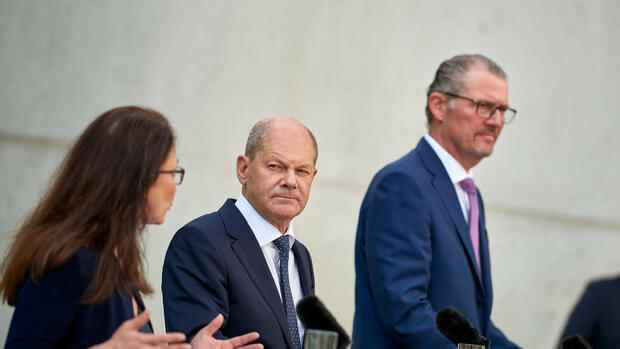DGB boss Yasmin Fahimi, Chancellor Olaf Scholz and BDA President Rainer Dulger comment after the consultations.
(Photo: IMAGO/Mike Schmidt)
Berlin Politicians and social partners want to continue to look for solutions together in the coming months in order to dampen the effects of the sharp rise in prices for citizens and companies. “We are facing a historic challenge,” said Chancellor Olaf Scholz (SPD) after the start of the so-called “concerted action” on inflation. The current crisis will not be over in a few months.
In addition to members of the government and representatives of employers and trade unions, economists and Bundesbank President Joachim Nagel also attended the meeting in the Chancellery. No concrete decisions were made. Results should be available in the fall. Scholz announced that they would meet regularly and exchange ideas in the future.
In the run-up to the meeting, Scholz had caused dissatisfaction among the social partners with the suggestion that employers could offer tax-free one-off payments and thus avoid excessive collective agreements. “Wage increases are negotiated exclusively by the collective bargaining parties,” Employer President Rainer Dulger emphasized after the meeting in the Chancellery.
Politicians can help, however, so that employees have more net income from the gross, for example by reducing cold progression or reducing taxes and social security contributions.
Top jobs of the day
Find the best jobs now and
be notified by email.
DGB boss Yasmin Fahimi referred to the relief package already launched by politicians with a volume of 30 billion euros, which will relieve an average household of around 1000 euros a year. “That’s a significant sum,” emphasized Fahimi, but the burdens went well beyond that.
>>Read here: “Breathing” thanks to the nine-euro ticket: Inflation in Germany is surprisingly fallingEmployers and trade unions currently see the inflation drivers above all in the sharp rise in energy and raw material costs. Energy tax and grid fees are good levers to take countermeasures here, said Dulger. The DGB had proposed a gas price cap. Neither Fahimi nor Dulger currently see wages as a price driver.
More Handelsblatt articles on the effects of inflation
However, the IG Metall districts have just spoken out in favor of a wage demand of eight percent for twelve months for the 3.9 million employees in the metal and electrical industry before the upcoming round of wage negotiations. They are thus at the upper end of the range of seven to eight percent recommended by the IG Metall board. The final decision on the claim will be made on July 11th. SPD leader Saskia Esken encouraged the unions on Deutschlandfunk on Monday to strive for high wage agreements. Last year, despite rising inflation, wage increases averaged just two percent.
The opposition criticized both the measures and the communication of the federal government in the fight against inflation. According to Union parliamentary group leader Jens Spahn (CDU), Chancellor Scholz should have used the start of the “concerted action” for a “whatever it takes” moment. Inflation is heavily dependent on the price expectations of citizens, which he could have dampened in this way. In 2012, the head of the ECB, Mario Draghi, calmed down the financial markets during the sovereign debt crisis by saying “whatever it takes”. Scholz must “subordinate everything else to combating inflation,” demanded Spahn.
More: Why the prices for the rich rise only half as much as for the poor

